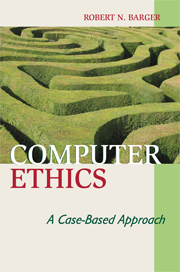Book contents
- Frontmatter
- Contents
- Preface
- Acknowledgments
- 1 Introduction
- 2 The Computer as a Humanizing Agent
- 3 Philosophic Belief Systems
- 4 A Philosophic Inventory
- 5 The Possibility of a Unifying Ethical Theory
- 6 The Ethical Decision-Making Process
- 7 Psychology and Computer Ethics
- 8 The Computing Field as a Profession
- 9 Computer-Related Codes of Ethics
- 10 Computer Ethics and International Development
- 11 Robotics and Ethics
- 12 Theft and Piracy Concerns
- 13 Cases Concerning Theft and Piracy
- 14 Privacy Concerns
- 15 Cases Concerning Privacy
- 16 Power Concerns
- 17 Cases Concerning Power
- 18 A Miscellaneous Collection of Cases
- 19 Parasitic Computing Case
- Appendix: Topics for Presentations, Discussions, and Papers
- Notes
- Selected Bibliography
- Index
Appendix: Topics for Presentations, Discussions, and Papers
Published online by Cambridge University Press: 05 June 2012
- Frontmatter
- Contents
- Preface
- Acknowledgments
- 1 Introduction
- 2 The Computer as a Humanizing Agent
- 3 Philosophic Belief Systems
- 4 A Philosophic Inventory
- 5 The Possibility of a Unifying Ethical Theory
- 6 The Ethical Decision-Making Process
- 7 Psychology and Computer Ethics
- 8 The Computing Field as a Profession
- 9 Computer-Related Codes of Ethics
- 10 Computer Ethics and International Development
- 11 Robotics and Ethics
- 12 Theft and Piracy Concerns
- 13 Cases Concerning Theft and Piracy
- 14 Privacy Concerns
- 15 Cases Concerning Privacy
- 16 Power Concerns
- 17 Cases Concerning Power
- 18 A Miscellaneous Collection of Cases
- 19 Parasitic Computing Case
- Appendix: Topics for Presentations, Discussions, and Papers
- Notes
- Selected Bibliography
- Index
Summary
Accountability of bloggers – A blog is a Web site containing analyses, opinions, and sometimes hyperlinks. What is the accountability of the owner of the blog for this material?
Carnivore's use by the FBI – Carnivore is an investigative device used to monitor e-mail and other electronic communications by means of “packet sniffing.” It has raised privacy concerns.
Computer viruses – Programs that enter a computer through trickery or stealth, infecting it and usually corrupting its data and/or affecting its operation.
Credit card fraud online – Often involves “spoofing” (see Web spoofing) to obtain personal information that will enable illicit use of a credit card.
Cybersquatting – Usually involves investing in domain names that might in turn be sold to companies for a higher price than was originally paid.
Data mining – The practice of sifting through large amounts of data in search of information that might be used for commercial purposes, for example, to target potential customers.
Dating on the Internet – Involves using the Internet to find and make contact with other people for romantic purposes. The anonymity afforded by the Internet can make this a dangerous activity, however.
Fake ID manufacture and sale with computers – Involves use of Internet technology to sell fake identification cards (e.g., drivers' licenses). These are often described by the online sales sites as “novelty” cards to avoid criminal liability for their sale.
Gambling on the Internet – Involves wagering on sports events or games of chance. This activity often involves offshore sites and runs the risk of inauthentic practices that make the odds of winning (or being paid off) much less than they are at a physical casino or sports facility.
Information
- Type
- Chapter
- Information
- Computer EthicsA Case-based Approach, pp. 227 - 230Publisher: Cambridge University PressPrint publication year: 2008
